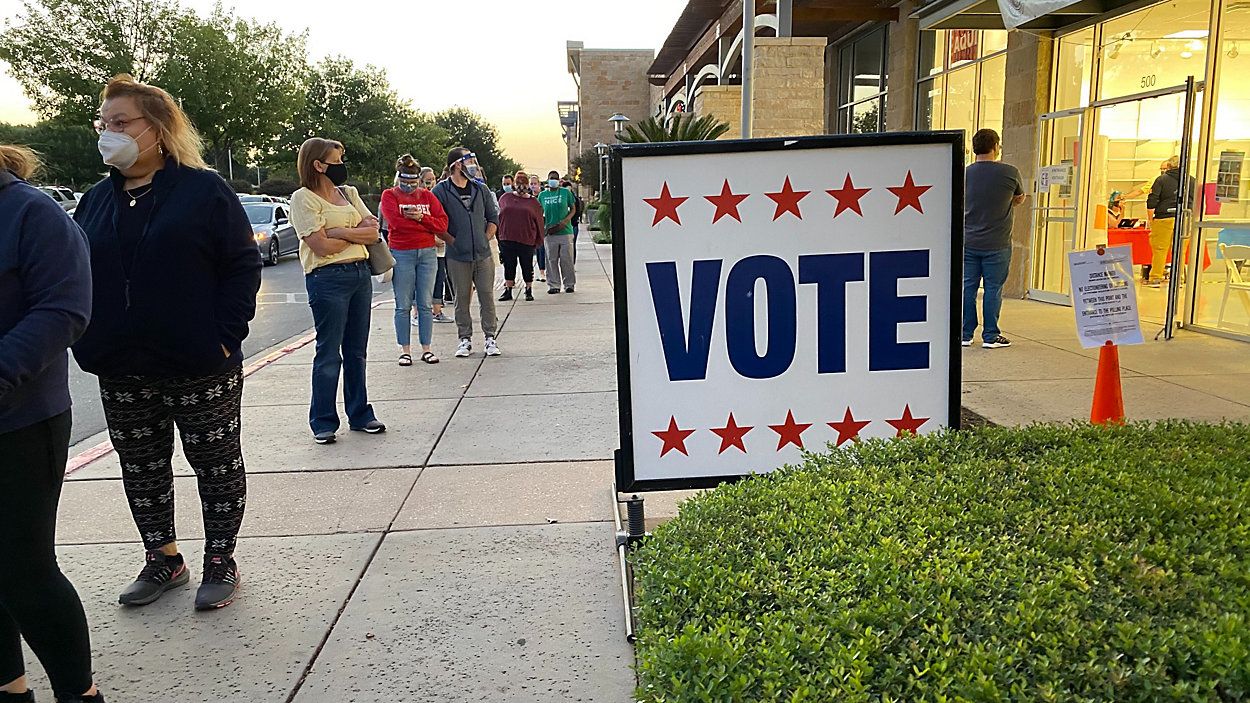AUSTIN, Texas — Resisting opposition from civil rights organizations and businesses, Texas Republicans came out with the details of a far-reaching bill that would tighten voting rules in the state and limit local control of future elections.
A small group of lawmakers from both chambers on Saturday finished working out the details of Senate Bill 7, which reflects a GOP-led insistence on “election integrity” across the nation. This, despite no evidence of widespread voter fraud anywhere in the country and officials with the Texas Secretary of State noting the November elections were secure. The Senate and House are expected to sign off on the changes Sunday before it heads to Gov. Greg Abbott’s desk to become law.
The final details of the measure include provisions targeting Harris County over the popular expanded voting options elections administrators implemented last November amid the coronavirus pandemic. County officials in the Houston area instituted drive-thru voting and 24-hour early voting. The proposed legislation would ensure no Texas county could do so again.
The bill prohibits using tents, garages or “temporary moveable structures” as a polling site and bans voting from inside a car. Under the bill, early voting could only be from 6 a.m. to 9 p.m. On the last Sunday of the early voting period, those hours would reduced to 1 p.m. to 9 p.m.
Last November, Harris County officials also tried to send mail-in ballot applications to all of the county's registered voters. In this measure, sending unsolicited ballot applications or using public funds to distribute them would become a state jail felony.
“Houston is not the capital of Texas, and Harris County can't make up the law as they go along. We had one county in one election create stuff that was not in the law, so this bill says, 'follow the law,'” Sen. Bryan Hughes, R-Mineola, recently told Capital Tonight.
Hughes is the sweeping bill’s author and therefore played a key role in the closed-door negotiations.
The bill additionally adds new stipulations to mail-in voting in Texas, which already has some of the strictest rules. Texas is among the only states where only specific people are allowed to request an absentee ballot and they must provide a reason. Explicitly stated in the bill, a lack of transportation or “illness, injury, or disability” without the likelihood of “personal assistance” or further injury to a voter’s health does not constitute reasons to vote by mail.
Another new rule would make it so a vote-by-mail application must include the voter’s driver's license, Social Security number or a statement explaining why a voter does not have identification.
One of the biggest stick points throughout the legislative session was how much authority poll watchers that parties recruit and select should be given. According to the amended bill, a “watcher is entitled to sit or stand near enough to see and hear” any “activity” conducted at the polling location. The bill also says “a watcher may not be denied free movement where election activity is occurring within the location at which the watcher is serving.”
Lawmakers did end up eliminating one controversial provision that would have allowed watchers to record voters who needed help filling out their ballots. It raised a red flag among voting rights groups who feared such action could intimidate voters living with disabilities and those who need interpretation.
Among other new rules, the bill included a section on the ability to “overturn” elections. If the bill becomes law, if the number of “votes illegally cast in the election” is at least equal to the number of votes necessary to change the outcome of an election, a court could declare an election void “without attempting to determine how individual voters voted.”
When copies of the final version started circulating, voting rights groups joined Democrats in quickly denouncing the proposed legislation.
“SB 7 is a ruthless piece of legislation,” said Sarah Labowitz, the policy and advocacy director at the American Civil Liberties Union of Texas. “It targets voters of color and voters with disabilities, in a state that’s already the most difficult place to vote in the country.”
Texas counties would also have to implement a new video surveillance system from the time ballots are delivered to counting stations to the time they are delivered to the signature verification committee. Those videos must be made available to the public.
The fight over voting rights in Texas has also caught the attention of President Joe Biden, who sent out a statement Saturday saying the bill was "part of an assault on democracy."
“Today, Texas legislators put forth a bill that joins Georgia and Florida in advancing a state law that attacks the sacred right to vote. It’s part of an assault on democracy that we’ve seen far too often this year — and often disproportionately targeting Black and Brown Americans,” President Biden said. “It’s wrong and un-American. In the 21st century, we should be making it easier, not harder, for every eligible voter to vote.”



